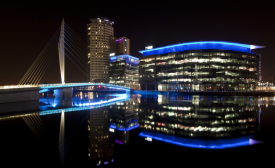credibility
The future of the BBC World Service as a credible and independent news organisation hangs in the balance (BBC plans TV and radio services for Russia and North Korea, 5 September). It is surprising that the BBC would wish to single out particular countries, rather than languages, that it wishes to target, thereby conceding ground to its critics around the world who view the World Service as an instrument of British propaganda.
Despite decades of U.S. sanctions against Iran, change came when the U.S. worked with Britain, France, Germany, Russia, China and the EU to forge the diplomatic agreement. The glue holding those relations together is U.S. credibility.
Last week, the entire world watched the United States Congress giving the Prime Minister of Israel, Benjamin Netanyahu, a fervent round of applause with 26 standing ovations. While almost all major world powers criticize Netanyahu’s position against nuclear negotiations with Iran, the U.S. Congress embraced it with open arms. What message does this send to the rest of the world?

The best known example of public diplomacy broadcasting just ended. Did you notice?

Strategically, the default to “propaganda” creates blind spots, its own reverse deception, and most importantly, a lost opportunity.

I have traveled to dozens of countries, but my trip to North Korea this past February was the most unforgettable experience of my life. My plan of going to a country with a “totalitarian” regime, known for its chronic famine and political oppression, intrigued many of my peers in China. They were surprised by my “unusual interest,” asking “Why North Korea?” I replied, “Because it is a different world; because I see similarities between China and North Korea; because as a Chinese citizen, I have the privilege to travel to North Korea easily.”
Watching the events unfold in Egypt over the past weeks has been akin to watching a slow moving train wreck as two powerful forces – the army and the Muslim Brotherhood – collide together. Both have strong wills, resources, and high stakes in the outcome. Whereas social media played a pivotal role in uniting the Egyptian public during the January 25 revolution in 2011, it appears that mass media may be playing the critical role in dividing the Egyptian public during the current events.

Watching the events unfold in Egypt over the past weeks has been akin to watching a slow moving train wreck as two powerful forces – the army and the Muslim Brotherhood – collide together. Both have strong wills, resources, and high stakes in the outcome.







